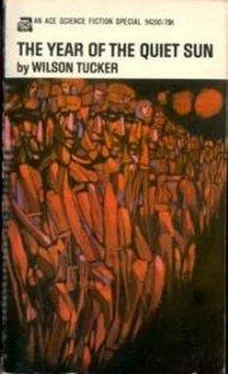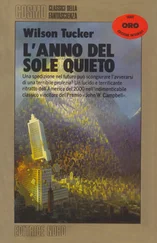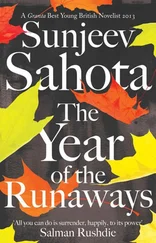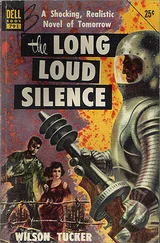Wilson Tucker - The Year of the Quiet Sun
Здесь есть возможность читать онлайн «Wilson Tucker - The Year of the Quiet Sun» весь текст электронной книги совершенно бесплатно (целиком полную версию без сокращений). В некоторых случаях можно слушать аудио, скачать через торрент в формате fb2 и присутствует краткое содержание. Год выпуска: 1970, ISBN: 1970, Издательство: Ace Books, Жанр: Фантастика и фэнтези, на английском языке. Описание произведения, (предисловие) а так же отзывы посетителей доступны на портале библиотеки ЛибКат.
- Название:The Year of the Quiet Sun
- Автор:
- Издательство:Ace Books
- Жанр:
- Год:1970
- ISBN:0-441-94201-6
- Рейтинг книги:3 / 5. Голосов: 1
-
Избранное:Добавить в избранное
- Отзывы:
-
Ваша оценка:
- 60
- 1
- 2
- 3
- 4
- 5
The Year of the Quiet Sun: краткое содержание, описание и аннотация
Предлагаем к чтению аннотацию, описание, краткое содержание или предисловие (зависит от того, что написал сам автор книги «The Year of the Quiet Sun»). Если вы не нашли необходимую информацию о книге — напишите в комментариях, мы постараемся отыскать её.
Won retrospective John W. Campbell Memorial Award in 1976.
Nominated for Nebula Award for Best Novel in 1970.
Nominated for Hugo Award for Best Novel in 1971.
The Year of the Quiet Sun — читать онлайн бесплатно полную книгу (весь текст) целиком
Ниже представлен текст книги, разбитый по страницам. Система сохранения места последней прочитанной страницы, позволяет с удобством читать онлайн бесплатно книгу «The Year of the Quiet Sun», без необходимости каждый раз заново искать на чём Вы остановились. Поставьте закладку, и сможете в любой момент перейти на страницу, на которой закончили чтение.
Интервал:
Закладка:
Moresby scrabbled across the exposed slope and fell into the hole with the soldier.
The man wore Corporal’s stripes on his only arm and clutched at a strap which had once been attached to a radio; the remainder of each had been blown away. He didn’t move when Moresby landed hard beside him and burrowed into the bloodied pit. The Corporal stared helplessly at the place where Moresby had been, at the boiling column of oily smoke rising above the truck, at the coming sun, at the sky. His head would not turn. Moresby threw away his useless rations pack and tilted the canteen to the Corporal’s mouth. A bit of water trickled between his lips but the greater part of it ran down his chin and would have been lost, had Moresby not caught it in his hand and rubbed it over the man’s mouth. He attempted to force more between the lips.
The Corporal moved his head with a feeble negative gesture and Moresby stopped, knowing he was choking on the water; instead, he poured more into his open palm and bathed the Corporal’s face, pulling down the wide eyelids with a wet caressing motion of his fingers. The bright and hurtful sky was shut out.
Wind roared across the face of the slope and over the plowed field below, sweeping toward the lakefront.
Moresby raised his eyes to study the slope and the field. A carelessly exposed foot and ankle were visible behind a tree stump. Calmly — without the haste that might impair his aim — he brought up his rifle and put a single slug into the ankle. He heard a bellowing cry of pain, and the curse directed at him. The target vanished from sight. Moresby’s gaze came back to the empty shoes and helmet liner beyond the shell hole. He decided to move — knew he had to move now to prevent that mortar from coming in on him.
He fired again at the stumps to keep the mortarman down, then sprinted for the ruptured hole in the fence where the bodies of the two aggressors lay. He fell on his belly, fired another round and then jumped on all fours against the nearest body, burrowing down behind it as a shield against the mortarman. The raging wind blew over the hole.
Moresby plucked at the bandit’s shirt, tearing away the armband and bringing it up to his eyes for a careful inspection.
It was no more than a strip of yellow cotton cloth cut from a bolt of goods, and bearing a crude black cross in India ink. There was no word, slogan, or other point of identification to establish a fealty. Black cross on yellow field. Moresby prodded his memory, wanting to fit that symbol into some known civilian niche. It had to fit into a neat little slot somewhere. His orderly mind picked and worried at the unfamiliar term: ramjet .
Nothing. Neither sign nor name were known prior to the launch, prior to 1978.
He rolled the stiffening body over on its back the better to see the face, and knew jarring shock. The black and bloodied face was still twisted in the agony of death. Two or more slugs had torn into the man’s midsection, while another had ripped away his throat and showered his face with his own blood; it had not been instantaneous death. He had died in screaming misery alongside the man next to him, vainly attempting to break through the fence and take the defenders up the slope.
Major Moresby was long used to death in the field; the manner of this man’s dying didn’t upset him — but the close scrutiny of his enemy jolted him as he’d not been jolted before. He suddenly understood the crude black cross etched on the yellow field, even though he’d not seen it before today. This was a civilian rebellion — organized insurrection.
Ramjets were Negro guerrillas.
The mortar coughed down the slope and Major Moresby burrowed in behind the body. He waited impatiently for the round to drop somewhere behind him, above him, and then by God he’d take that mortar.
The time was twenty minutes after six in the morning, 4 July 1999. The rising sun burned the horizon.
A ramjet mortarman with a shattered ankle peered warily over a tree stump, and counted himself the victor.
Lieutenant Commander Arthur Saltus
23 November 2000
Yesterday this day’s madness did prepare;
Tomorrow’s silence, triumph, or despair:
Drink! for you know not whence you came, nor why;
Drink! for you know not why you go, nor where.
THIRTEEN
Saltus was prepared to celebrate.
The red light blinked out. He reached up to unlock the hatch and throw it open. The green light went dark. Saltus grasped the two handrails and pulled himself to a sitting position with his head and shoulders protruding through the hatchway. He was alone in the room as he expected to be, but he noted with mild surprise that some of the ceiling lights had burned out. Sloppy housekeeping. The air was chill and smelled of ozone. He struggled out of the hatch and climbed over the side; the step stool was missing and he slid down the hull to the floor. Saltus reached up to slam shut the hatch, then turned to the locker for his clothing.
Another suit belonging to Chaney hung there in its paper sheath waiting to be claimed. He noted the locker had collected a heavy amount of dust and a fine film of it had even crept inside. Wretched housekeeping. When Saltus was dressed in the civvies he had elected to wear, he took out a pint of good bourbon from its place of concealment in the locker and surreptitiously slipped the bottle into a jacket pocket.
He thought he was adequately prepared for the future.
Arthur Saltus checked his watch: 11:02. He sought out the electric calendar and clock on the wall to verify the date and time: 23 Nov 00. The clock read 10:55. Temperature was a cold 13 degrees. Saltus guessed his watch was wrong; it had been wrong before. He left the room without a glance at the cameras, secretively holding his hand against the bottle to mask the pocket bulge. He didn’t think the engineers would approve of his intentions.
Saltus walked down the corridor in eerie silence to the shelter; dust on the floor muffled his footfalls and he wondered if William had found that same dust sixteen months earlier. The old boy would have been annoyed. The shelter door was pushed open and the overhead lights went on in automatic response — but again, some of them were burned out. Somebody rated a gig for poor maintenance. Saltus stopped just inside the door, pulled the bottle from his pocket and ripped away the seal from the cap.
A shout rattled the empty room.
“Happy birthday!”
For a little while, he was fifty years old.
Saltus swallowed the bourbon, liking its taste, and wiped his mouth with the back of his hand; he stared around the shelter with growing curiosity. Somebody had been at the ship’s stores — somebody had helped himself to the provisions set by for him and then had carelessly left the debris behind for him to find. The place was overrun with privateers and sloppy housekeepers.
He discovered a gasoline lantern on the floor near his feet and reached down quickly to determine if it was warm. It was not, but a jostling shake told him there was fuel remaining in the tank. Many boxes of rations had been cut open — emptied of their contents — and the cartons stacked in a disorderly pile along the wall near the door. A few water containers rested beside the cartons and Saltus grabbed up the nearest to shake it, test it for use. The can was empty. He took another long pull from his birthday bottle and roamed around the room, making a more detailed inspection of the stores. They weren’t in the ship-shape order he remembered from his last inspection.
A sealed bag of clothing had been torn open, a bag holding several heavy coats and parkas for winter wear. He could not guess how many had been taken from the container.
Читать дальшеИнтервал:
Закладка:
Похожие книги на «The Year of the Quiet Sun»
Представляем Вашему вниманию похожие книги на «The Year of the Quiet Sun» списком для выбора. Мы отобрали схожую по названию и смыслу литературу в надежде предоставить читателям больше вариантов отыскать новые, интересные, ещё непрочитанные произведения.
Обсуждение, отзывы о книге «The Year of the Quiet Sun» и просто собственные мнения читателей. Оставьте ваши комментарии, напишите, что Вы думаете о произведении, его смысле или главных героях. Укажите что конкретно понравилось, а что нет, и почему Вы так считаете.












